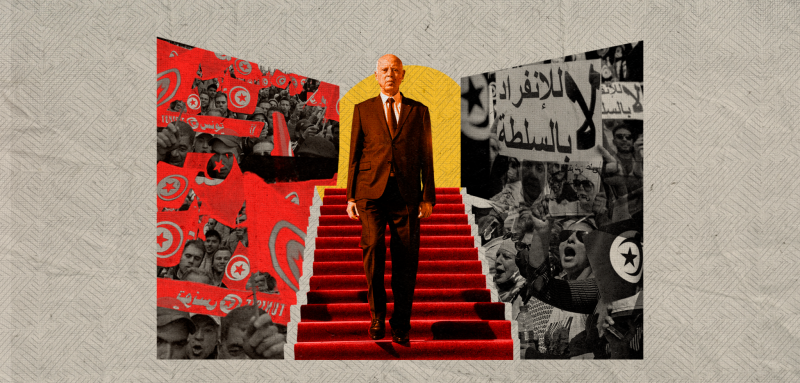The clock has finally struck election time in Tunisia, though the political landscape now sees many of its once familiar players either behind bars or sidelined. After much back and forth regarding the timing of the elections, and even whether they would occur, amidst a backdrop of political arrests, President Kais Saied broke his silence. He ended the speculation by calling on voters to participate in the presidential elections on Sunday, October 6, 2024.
Coinciding with Saied's announcement and that by the Independent High Authority for Elections (ISIE) to begin accepting candidacy applications from July 29, a series of arrests and restrictions have continued to take place. Saied, who has held a tight grip on all state affairs and apparatus since July 2021, is now targeting the most serious potential contenders to his presidency.
The phrase "What's your crime? Running for president," has become a dark joke circulating Tunisian social media, encapsulating the grim situation facing Tunisia's democratic experience that was once the envy of the rest of the Arab peoples. This raises serious questions about the integrity of the election and its ability to reflect the will of the Tunisian people.
Is Kais Saied intending to enter the race alone?
Several political activists expressed their desire to join the race following the start of the electoral period on July 14, which extends until the announcement of the final results of the presidential elections. However, after a cautious calm, there was a sudden increase in prosecutions and arrests, particularly targeting key competitors in the election.
On July 19, Kais Saied announced his candidacy, stating he was "responding to the sacred call of national duty." He delivered this brief announcement from Borj El Khadra, in Tunisia’s far south. Opposition parties are now accusing Saied of exerting pressure on the judiciary to exclude all competitors, effectively clearing his path to a second term.
On July 19, President Kais Saied announced his candidacy, stating he was "responding to the sacred call of national duty." Following a cautious calm, there was a sudden increase in prosecutions and arrests. Saied, who has held a tight grip on all state affairs and apparatus since July 2021, is now targeting what are widely regarded as the most serious potential contenders to his presidency.
Saied, who has been effectively campaigning early, also began his crackdown on potential rivals over a year ago. Most political leaders, across all spectrums and from all factions, have been imprisoned for over 17 months. Lawyers describe their trials as a "farce," pointing out the lack of incriminating evidence in the cases. As the election date nears, Saied's continues to tighten his grip, using the judiciary and the electoral authority, according to opposition narratives.
During a press conference announcing the 2024 presidential election schedule, Farouk Bouasker, head of the Tunisian Independent High Authority for Elections (ISIE), mentioned that the commission had met to approve the election timeline and amend Decision No. 18 of 2014, dated August 4, 2014, regarding the rules and procedures for presidential candidacy. One of the most prominent conditions is that candidates must have no criminal record.
This decision has sparked a legal, constitutional, and political controversy, with the opposition in the country arguing that "legislating new conditions for the presidential elections through the use of executive orders represents a dangerous precedent in the history of the rule of law in Tunisia."
Additionally, activists and observers have criticized what they call "impossible conditions" imposed by the electoral commission to pave the way for Kais Saied to remain in the Carthage Palace. These include requiring candidates to personally appear at the commission's headquarters to obtain nomination forms or to delegate a representative (through special power of attorney). This last requirement poses a significant obstacle for candidates in prison, as obtaining a special legal power of attorney requires prior judicial permission to visit the prisons and issue the power of attorney.
Candidates behind bars, as others face "restrictions"
Meanwhile, Wissam al-Saghir, the spokesperson for the republican opposition party, expressed his shock and disapproval of the delayed announcement of the election date. He stated, "40% of the world's population will participate in voting in their countries before the end of the year and have known their election dates well in advance, except for the Tunisian people, who had to wait until three and a half months before the end of the presidential term to learn about the date of the most important electoral race in the country. As if that wasn't enough, the announcement was followed by a series of measures that seem aimed at restricting and clearing the field of any real and serious competition."
The Republican Party in Tunisia announced the withdrawal of its secretary-general, Issam Chebbi's candidacy for the presidential elections after the electoral commission refused to provide him with the nomination form submitted by one of his lawyers.
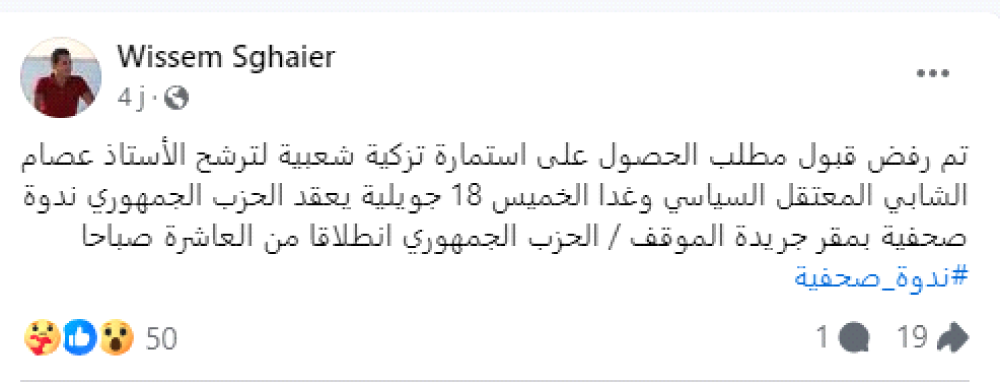 Kais Saied eliminates potential competitors in the 2024 presidential elections
Kais Saied eliminates potential competitors in the 2024 presidential elections
The former Secretary-General of the Democratic Current Party, Ghazi Chaouachi, faced a similar fate. Despite announcing his candidacy from prison, he was unable to obtain the nomination form from the electoral commission.
Abir Moussi, head of the Free Destourian (constitutional) Party, who had previously announced her candidacy for the presidential elections from prison, also failed to obtain the same form through her lawyer from the electoral commission.
The joke "What's your crime? Running for president," has been circulating on Tunisian social media, encapsulating the grim situation facing Tunisia's democratic experience that was once the envy of the rest of the Arab peoples. This raises serious questions about the integrity of the election and its ability to reflect the will of the Tunisian people.
Following the arrest of Ajmi Lourimi, secretary-general of the Ennahda Movement, and his companions, Amnesty International stated, “it is outrageous to see the Tunisian authorities trampling on people’s rights in their bid to undermine the political opposition.”
Amnesty International added, “These arrests are particularly concerning ahead of the upcoming presidential elections.” It further stated that “the Tunisian authorities’ disrespect for human rights and their crackdown against opponents must stop. From arbitrary arrests of critical journalists, lawyers, activists and politicians to the systematic undermining of judicial independence, authorities must reverse this repressive path to put human rights front and center of government.”
Earlier this year, Amnesty International Secretary General Agnès Callamard said, “It is alarming and distressing to witness the drastic rollback of the human rights progress that Tunisia had made since the 2011 revolution.”
Tunisia, one of the first countries to resist tyranny and oppression, now finds itself "back to square one... facing repression, tyranny, and sham elections, which are merely an endorsement for President Kais Saied, who has overthrown a constitution written with the blood of martyrs, along with the sacrifices of the Tunisian people."
Serious potential candidates who might compete with Kais Saied have also been subjected to this harrassment. Among the notable figures harassed is the secretary-general of the Labor and Achievement Party, Abdul Latif al-Makki, who was summoned for investigation just a few days after his party announced his candidacy for the presidential elections. On Friday, July 12, the chief judge of the Tunisia Primary Court decided to impose travel restrictions, a media ban, and a restriction on his residence.
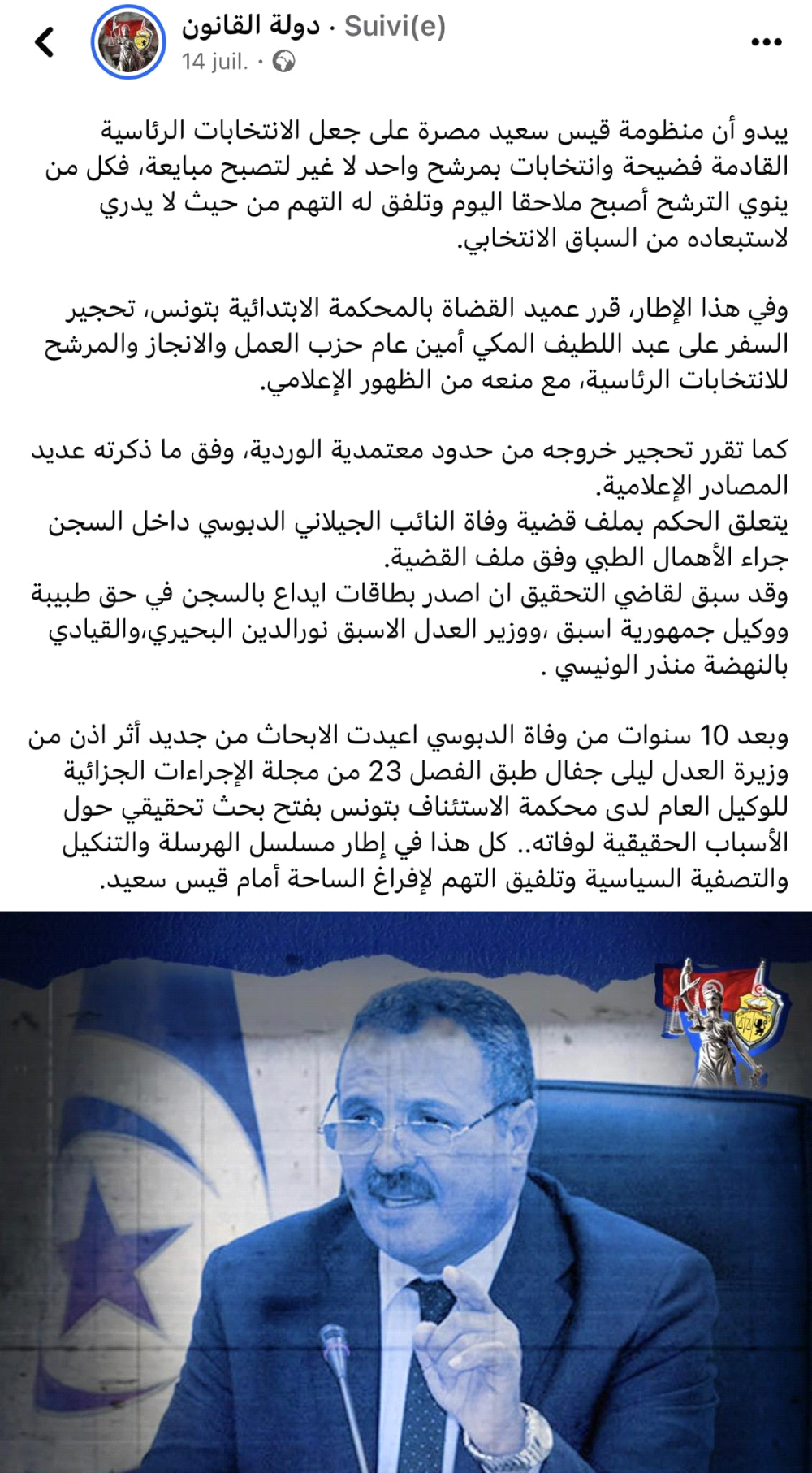 Kais Saied eliminates potential competitors in the 2024 presidential elections
Kais Saied eliminates potential competitors in the 2024 presidential elections
On June 27, the Tunisia Court sentenced former MP and presidential candidate Safi Said to four months in prison in absentia on charges of forgery and fraud.
Another veteran candidate, Mondher Zenaidi, awaits a ruling on the case referred to the indictment chamber of the Tunisia Primary Court in March 2024. The charges involve financial corruption related to the privatization of a transport company in 2011, following a report by the National Fact-Finding Committee on Corruption and Bribery, chaired at the time by Abdel Fattah Omar. This case also implicates former Prime Minister Mohamed Ghannouchi, the son-in-law of former President Zine El Abidine Ben Ali, Sakher El Materi, and other officials.
The leader of the Republican People's Union Party, Lotfi Mraihi, faced an even harsher fate when the judiciary sentenced him to eight months in prison and barred him from running for the presidential elections for life, a decision described to Raseef22 as "unprecedented."
Wissam al-Saghir remarked, "The electoral period began amid an atmosphere of closed competition, lacking a genuine environment where the people's will can be seriously and truly considered in choosing their representative based on content and programs." He added, "All we hear about are arrests, warrants, and summonses for investigations against all serious competitors in these elections, with the executive authority accusing any political and civil opposition of being a traitor."
Al-Saghir pointed to Article 54, describing it as a sword hanging over anyone who dares to think independently of the executive authority, along with the intimidation faced by the judiciary.
Al-Saghir concluded that "this 'foul' climate led the Republican Party to withdraw the candidacy of its secretary-general Issam Chebbi, who has been detained for 17 months, so we do not become witnesses to falsehood and deceit."
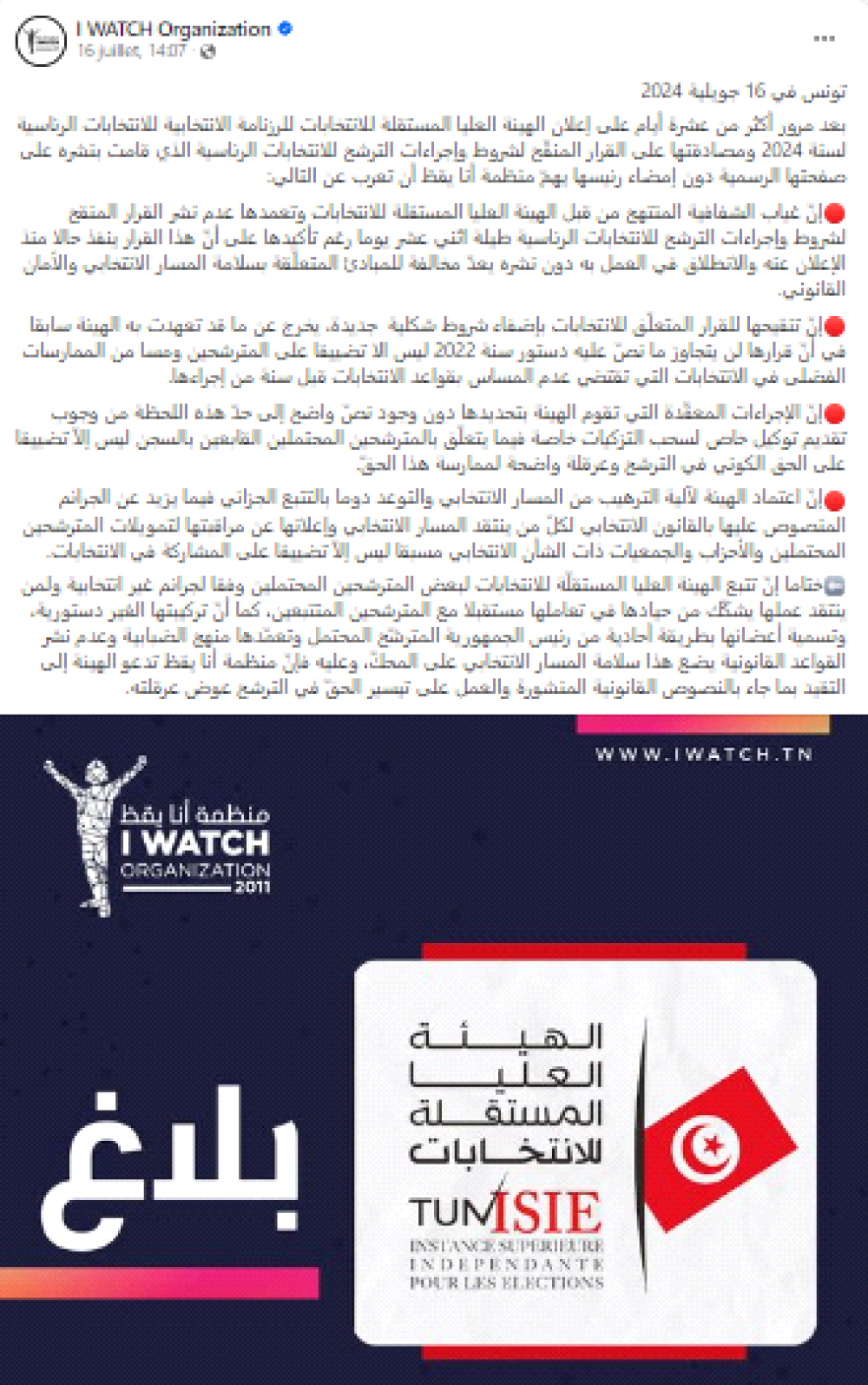 Kais Saied eliminates potential competitors in the 2024 presidential elections
Kais Saied eliminates potential competitors in the 2024 presidential elections
Seifeddine Abidi, a specialist in electoral affairs, noted that the recommendations of the Venice Commission had stipulated not to amend the electoral law in the election year, as happened in Tunisia with new executive orders regarding age, nationality, and candidacy conditions, which were issued just before the official announcement of the election calendar.
He considered the change in the fundamental electoral law through an executive decision to add new candidacy conditions by the electoral commission to be "contrary to the jurisprudence of the Administrative Court." In his conversation with Raseef22, he expressed surprise at the disregard and lack of respect for these norms.
Abidi added, "It would have been more appropriate to comply with the law, and there was sufficient time for presidential or parliamentary legislative initiatives to amend the electoral law." Regarding Certificate No. 3 (criminal record certificate), Abidi mentioned that the Primary Court had previously decided that candidates could submit a receipt from the Independent High Electoral Commission (ISIE) as a prerequisite for candidacy documents. This decision was due to the time required by the authority responsible for issuing Certificate No. 3, which the ISIE council had previously agreed upon as a fundamental condition for presidential candidacy.
Saied, who has been effectively campaigning early, began his crackdown on potential rivals early. Most political leaders, across all spectrums and from all factions, have been imprisoned for over 17 months.
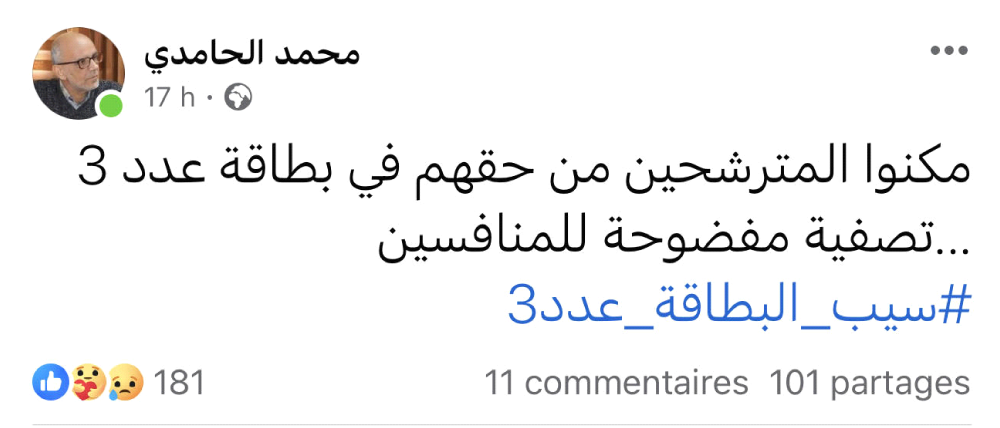 Kais Saied eliminates potential competitors in the 2024 presidential elections
Kais Saied eliminates potential competitors in the 2024 presidential elections
Moreover, Abidi pointed out that collecting 10,000 endorsements from each candidate across 10 electoral districts, with a minimum of 500 voters in each district (especially after increasing the number of districts from 27 to 161 following the 2023 legislative elections), is a condition laden with political calculations, making the candidate's task more difficult.
Abidi questioned the rationale behind replacing electronic endorsements, which were publicly accessible and posed risks to personal data, with physical endorsements. This change also pressures voters and compromises their freedom of choice. He concluded by saying, "This environment is not conducive to transparent and fair democratic elections."
The Electoral Commission rejects the accusations
On the other hand, the spokesperson for the Independent High Electoral Commission (ISIE), Mohamed Tlili Mansri, insisted that the commission had only amended three conditions of the electoral law related to candidacy rules to align with the 2022 Constitution. These amendments concern age, the prohibition of dual nationality candidates, and the requirement of enjoying civil and political rights. He asserted, "We are fully aware of our limits and powers," denying the commission's involvement in attempts to exclude or restrict candidates.
Mansri informs Raseef22 that "these conditions are old, and are present in the 2014 electoral law, and they are not amended for one group over another," pointing to the controversy stirred among the political class, especially after preventing candidates in detention, such as Issam Chebbi, Ghazi Chaouachi, and Abir Moussi, from obtaining endorsement forms.
Mansri continued by noting that some individuals, including those in prison like Lotfi Mraihi, submitted special authorizations to withdraw the endorsement forms. It's worth mentioning that the court has banned Mraihi from running for presidential elections for life.
Mansri also reported that as of Monday, July 22, 88 individuals had collected the popular endorsement forms for the 2024 presidential election. He explained that "the commission adopted protective policies by requiring candidates to obtain the endorsement form directly from the election commission's office, using a special form for collecting endorsements from voters. This measure aims to prevent the forgery of voter endorsements, an issue discovered in previous presidential elections."
"We are afraid of what will happen after these sham presidential elections if Kais Saied wins. However, we will not withdraw from the political arena. We will not abandon the demands of the Tunisian people. We are not traitors or conspirators, as the authorities label us. We are genuine actors in the political arena, and if a candidate emerges who truly represents the opposition and the national democratic movement, we will rally behind them."
Mansri believes that "the commission has made the process easier for candidates," noting that "the period for collecting endorsements will extend for 31 days, compared to 21 days in the 2019 elections. Furthermore, the requirements for endorsements have been expanded to include 10 members of the House of Representatives or the National Council of Regions and Districts, or 40 sitting local council leaders who are currently in office during the acceptance period for candidacies. These can include heads of local, regional, or municipal councils, or endorsements from 10,000 voters distributed across 10 electoral districts, with no fewer than 500 voters from each district."
This raises a pertinent question: How can a parliamentary, regional, or local representative elected after July 25, 2021, under the 2022 Constitution, endorse a candidate opposing the measures of July 25 that brought them and President Saied to power?
After 13 years of democracy... Back to square one
The onset of the 2024 electoral period brings a stark reminder of the pre-2011 era. Najla Qaddiyah, a leader of the Qotb Party, whose secretary-general Riadh Ben Fadhel has been imprisoned since November 14, 2023, believes that the current political climate does not allow for free and democratic elections.
She tells Raseef22 that Tunisia, one of the first countries to resist tyranny and oppression, now finds itself "back to square one... facing repression, tyranny, and sham elections." She described the 2024 presidential elections as "merely an endorsement for President Kais Saied, who has overthrown a constitution written with the blood of martyrs like Chokri Belaid and Mohamed Brahmi, along with the sacrifices of the Tunisian people."
Qaddiyah emphasized that "someone who overturns a constitution written in blood and sacrifice will manipulate the elections with the help of a non-independent electoral commission."
Wissam al-Saghir, who aligns himself with Qaddiyah and the broader political and human rights opposition, described the current situation as "extremely difficult and dangerous."
Comparing the political landscape of the past decade to the post-July 25, 2021 era, al-Saghir acknowledges that the period before these extraordinary measures was not ideal and had many flaws. However, it guaranteed freedoms and rights. He adds, "We cannot say that democracy has been completely buried as long as the societal forces remain active and alive, despite their weaknesses and the tight control over them. This is a temporary ordeal, and the living forces must come together and work to shorten its duration."
"The electoral period began amid an atmosphere of closed competition, lacking a genuine environment where the people's will can be seriously and truly considered in choosing their representative based on content and programs. All we hear about are arrests, warrants, and summonses for investigations against all serious competitors in these elections, with the executive authority accusing any political and civil opposition of being a traitor."
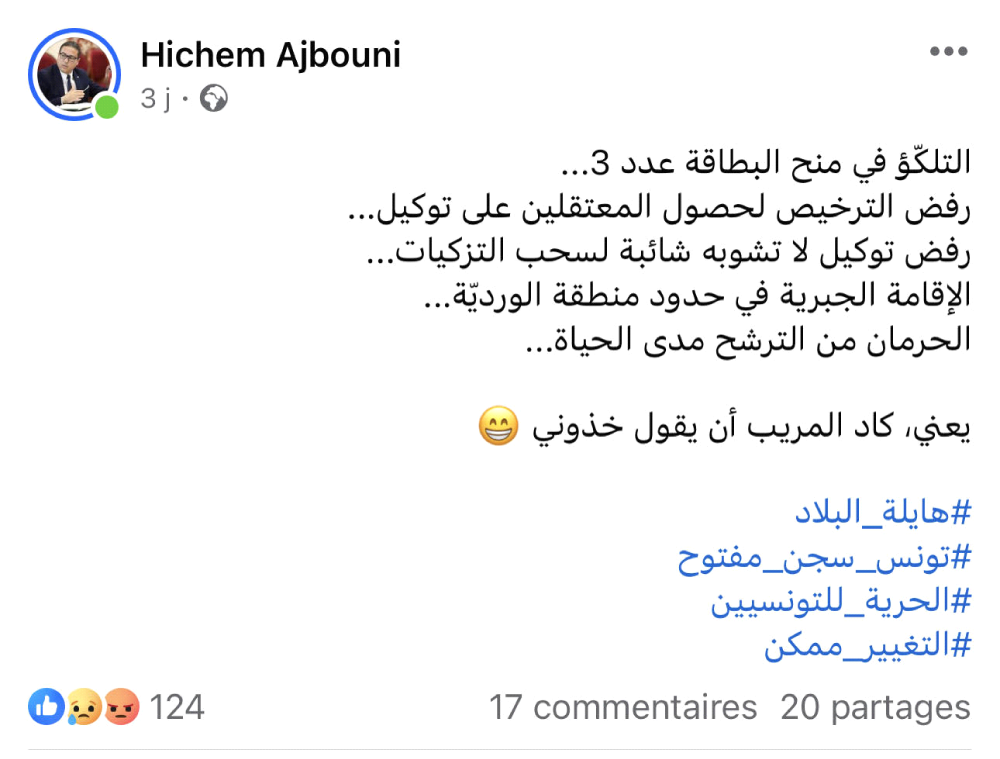 Kais Saied eliminates potential competitors in the 2024 presidential elections
Kais Saied eliminates potential competitors in the 2024 presidential elections
This leads to another question: Since July 25, 2021, what has Kais Saied not done to dismantle the democratic experience that he would need another presidential term to complete?
Najla Qaddiyah predicts increased repression after October 6, 2024, in the event that Kais Saied wins the election. She believes he has been ruling without legitimacy since July 25, 2021, has exceeded all his powers and violated rights and freedoms. Qaddiyah states, "He will become even more authoritarian after October 6, 2024, and will abuse power even more with the legitimacy that the elections will grant him, and the repression will be even uglier."
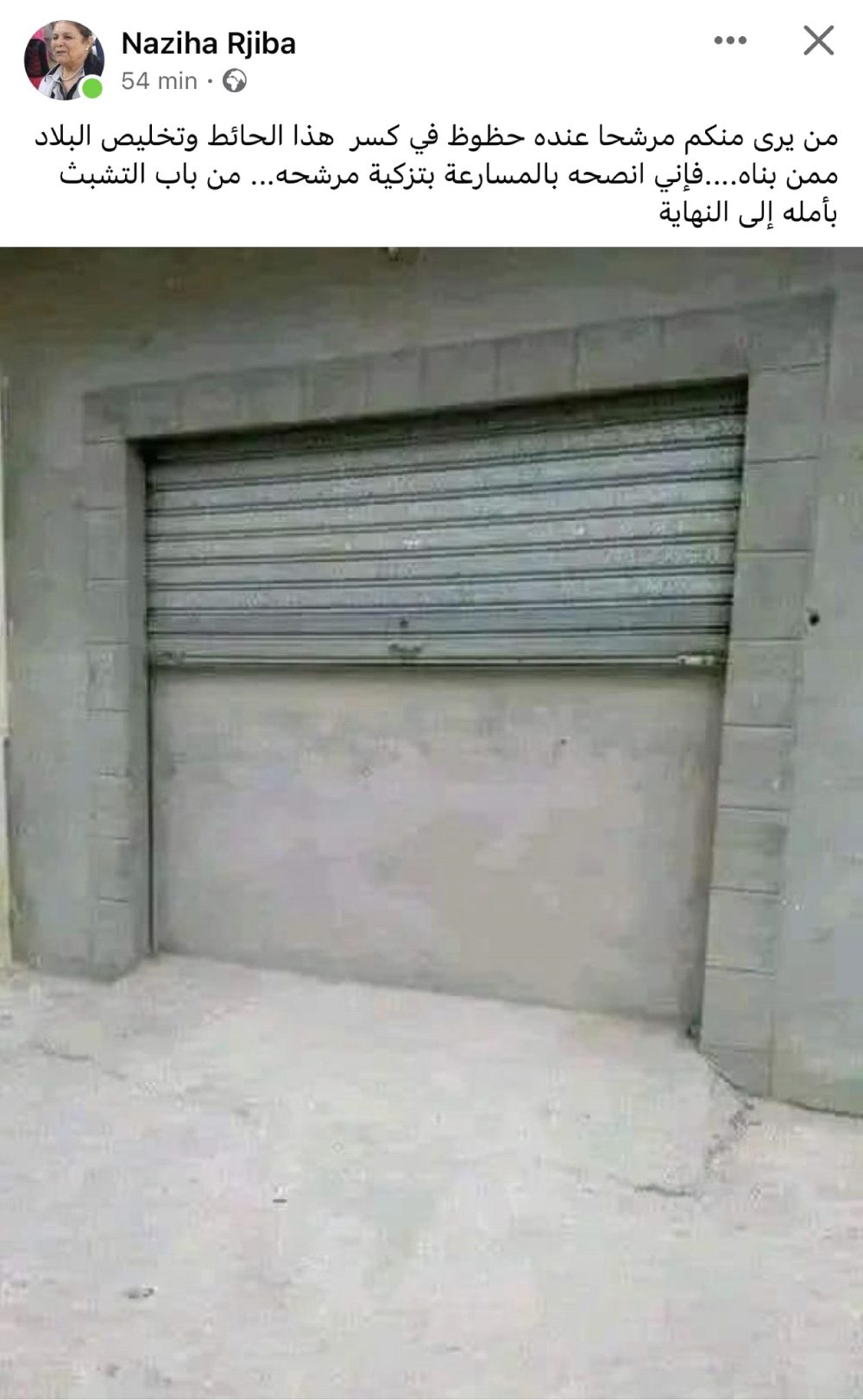 Kais Saied eliminates potential competitors in the 2024 presidential elections
Kais Saied eliminates potential competitors in the 2024 presidential elections
Qaddiyah continues, "We are afraid of what will happen after these sham presidential elections if Kais Saied wins. However, we will not withdraw from the political arena. We will not abandon the demands of the Tunisian people. We are not traitors or conspirators, as the authorities label us. We are genuine actors in the political arena, and if a candidate emerges who truly represents the opposition and the national democratic movement, we will rally behind them."
Raseef22 is a not for profit entity. Our focus is on quality journalism. Every contribution to the NasRaseef membership goes directly towards journalism production. We stand independent, not accepting corporate sponsorships, sponsored content or political funding.
Support our mission to keep Raseef22 available to all readers by clicking here!
Interested in writing with us? Check our pitch process here!
